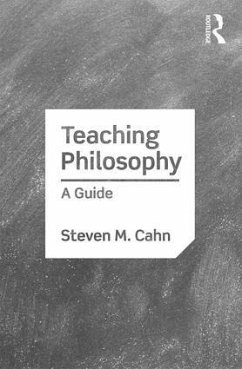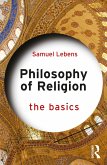Some students find philosophy engrossing; others are merely bewildered.
How can professors meet the challenge of teaching introductory-level philosophy so that their students, regardless of initial incentive or skill, come to understand and even enjoy the subject?
For nearly a decade, renowned philosopher and teacher Steven M. Cahn offered doctoral students a fourteen-week, credit-bearing course to prepare them to teach undergraduates. At schools where these instructors were appointed, department chairs reported a dramatic increase in student interest. In this book, Cahn captures the essence of that course.
Yet many of the topics he discusses concern all faculty, regardless of subject: a teacher's responsibilities, the keys to effective instruction, the proper approach to term papers, examinations, and grades; and suggestions for how administrators should demonstrate that they take teaching seriously. Such matters are covered in the first seven chaptersand in the final, fourteenth chapter. The intermediate six chapters focus on teaching introductory philosophy and, in particular, on critical thinking, free will, philosophy of religion, ethics, and political philosophy.
Cahn's writing is lucid and lively, using vivid examples and avoiding educational jargon. In sum, this book is not only a guide on how to inspire students but also an inspiration for teachers themselves.
How can professors meet the challenge of teaching introductory-level philosophy so that their students, regardless of initial incentive or skill, come to understand and even enjoy the subject?
For nearly a decade, renowned philosopher and teacher Steven M. Cahn offered doctoral students a fourteen-week, credit-bearing course to prepare them to teach undergraduates. At schools where these instructors were appointed, department chairs reported a dramatic increase in student interest. In this book, Cahn captures the essence of that course.
Yet many of the topics he discusses concern all faculty, regardless of subject: a teacher's responsibilities, the keys to effective instruction, the proper approach to term papers, examinations, and grades; and suggestions for how administrators should demonstrate that they take teaching seriously. Such matters are covered in the first seven chaptersand in the final, fourteenth chapter. The intermediate six chapters focus on teaching introductory philosophy and, in particular, on critical thinking, free will, philosophy of religion, ethics, and political philosophy.
Cahn's writing is lucid and lively, using vivid examples and avoiding educational jargon. In sum, this book is not only a guide on how to inspire students but also an inspiration for teachers themselves.
"For decades, Steve Cahn's students and colleagues have gained enormously from his constructive advice about teaching philosophy. This book enables a far wider audience to learn from him. In its general suggestions about teaching, as well as in its specific insights into introducing particular philosophical topics, it distills the wisdom accumulated in a lifetime - a lifetime imbued with passion for philosophical ideas and for their broad dissemination."
-Philip Kitcher, John Dewey Professor of Philosophy, Columbia University
"Professor Cahn's book is a valuable guide for teachers who want to have dedicated students. It concentrates especially on what students have a right to expect of a properly conceived, well-taught, and successfully administered course. More than that, it offers thoughtful insights into teaching such topics as reasoning, free will, philosophy of religion, ethics, and political philosophy. Even seasoned veterans of the classroom will find this book useful."
-William Mann, Professor Emeritus, University of Vermont
"Everything and everyone enters here, from Theocritus to Archie Bunker, from Plato to Thoreau, about ethics and reasoning and more. Philosophy appealing and unfrightening and learned enlivens the chapters of this reflection on how best to lead students into the thinking world."
Mary Ann Caws, Distinguished Professor Emerita of English, French, and Comparative Literature and Resident
-Professor, Graduate School, CUNY
". . . should be required reading for every professor and graduate student in the field!"
-Harvey Siegel, University of Miami
"The anthologies cover a wide variety of topics related to many situations of teachg philosophy and doing so with contributions from scholars of varying backgrounds and points of view."
-Frank Fair, Sam Houston State University
-Philip Kitcher, John Dewey Professor of Philosophy, Columbia University
"Professor Cahn's book is a valuable guide for teachers who want to have dedicated students. It concentrates especially on what students have a right to expect of a properly conceived, well-taught, and successfully administered course. More than that, it offers thoughtful insights into teaching such topics as reasoning, free will, philosophy of religion, ethics, and political philosophy. Even seasoned veterans of the classroom will find this book useful."
-William Mann, Professor Emeritus, University of Vermont
"Everything and everyone enters here, from Theocritus to Archie Bunker, from Plato to Thoreau, about ethics and reasoning and more. Philosophy appealing and unfrightening and learned enlivens the chapters of this reflection on how best to lead students into the thinking world."
Mary Ann Caws, Distinguished Professor Emerita of English, French, and Comparative Literature and Resident
-Professor, Graduate School, CUNY
". . . should be required reading for every professor and graduate student in the field!"
-Harvey Siegel, University of Miami
"The anthologies cover a wide variety of topics related to many situations of teachg philosophy and doing so with contributions from scholars of varying backgrounds and points of view."
-Frank Fair, Sam Houston State University








